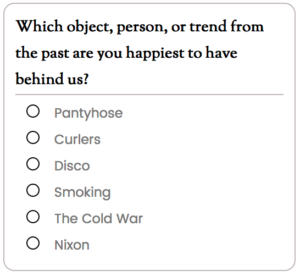 For the near future, Retrospect will discontinue weekly prompts. The last scheduled prompt was “All’s Well that Ends Well,” posted on Retrospect’s home page on December21. After that…
For the near future, Retrospect will discontinue weekly prompts. The last scheduled prompt was “All’s Well that Ends Well,” posted on Retrospect’s home page on December21. After that…
Writers can continue to post new stories on Retrospect’s existing prompts at “Past Prompts” or “My Own Topic.“
Readers can still enjoy Retrospect’s rich and extensive archive of stories searchable by topic or author and comment on existing stories as before.
We hope you’ll drop by Retrospect to explore, comment, or even contribute to Retrospect’s labyrinth of memories, dreams, and reflections.
Write on!
The Retrospect Team


